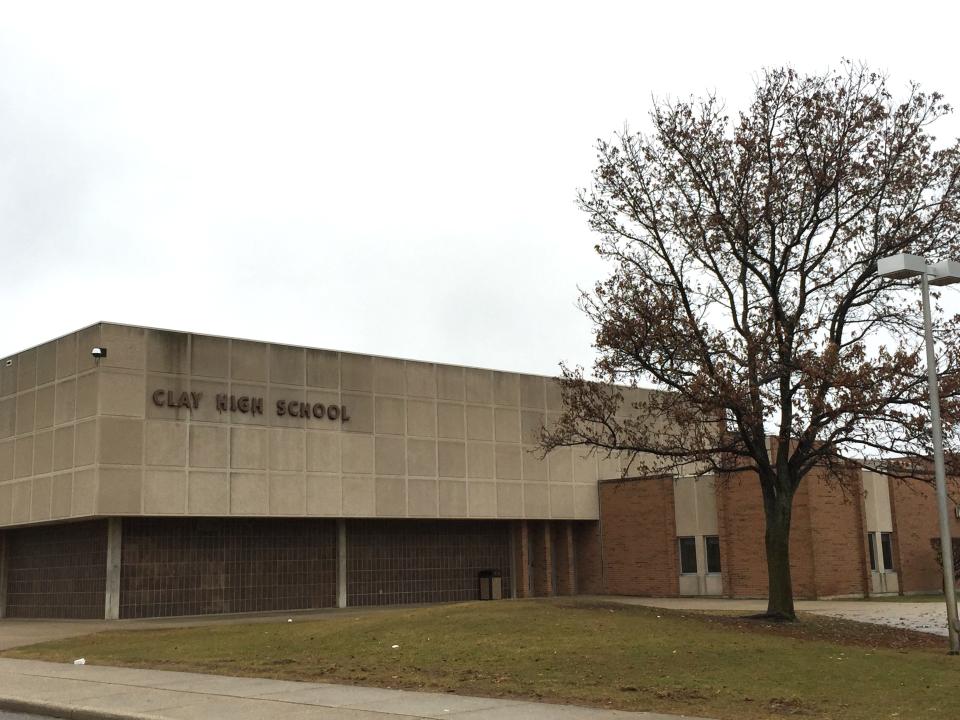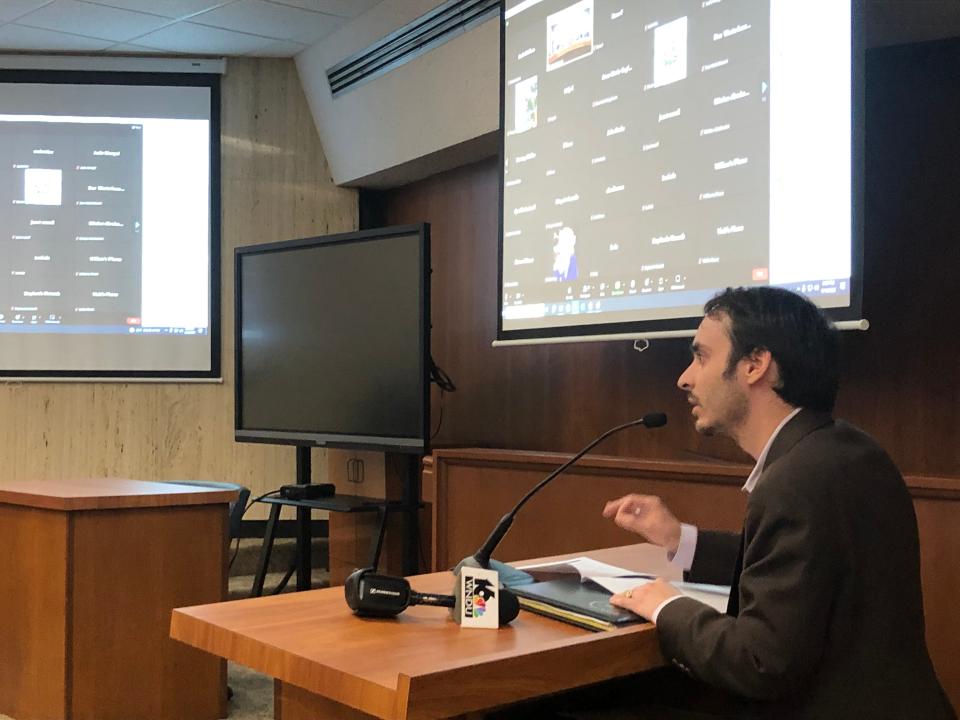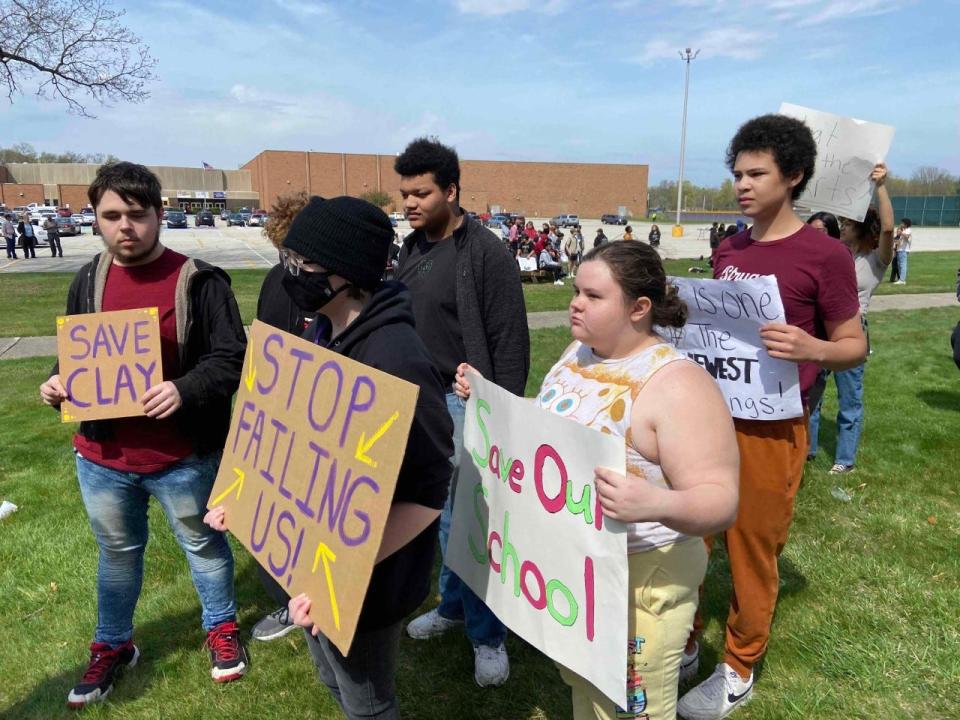Judge questions need for court intervention in Clay High School closure

SOUTH BEND — A federal judge pressured attorneys who came for oral arguments Tuesday on three sides of a case that claims that the closure of Clay High School — planned for 2024 — would violate the federal consent decree over the racial balance of students in South Bend schools.
U.S. District Court Judge Philip Simon, who's based in Hammond, Ind., drove hard on his question of whether his initial reaction is right — that the plaintiffs' motion to intervene is premature.
He asked why the court should intervene now when, in the end, his role is to decide whether the ultimate school closing plan meets the consent decree. That final plan hasn’t come to him yet.
“There has been a plan, tentative but increasingly detailed, that’s been available to the public,” attorney John Borkowski asserted as he represented the South Bend Community School Corp. “The school board has spent years developing a plan and trying to be transparent.”
Clay is due to close at the end of this school year, a decision that the school board made with a 4-3 vote in April. The district is coping with large enrollment losses across the district and expensive facility repairs at Clay.
Sept. 12, 2023: Council votes to endorse study of separate school district. Both sides speak of losses.
Borkowski further said that, in March, the school corporation made it known that students in Clay's fine arts magnet could elect to move to Riley High School so they could stay together.

And last week the district released its proposed new boundary maps for when Clay and Warren Elementary School both close next year as part of its Facilities Master Plan.
But filers of the motion to intervene say all of that falls short of the more detailed plan that eventually is expected. Even though Borkowski said that the options are out there, attorney Christian Matozzo countered that students are “in the lurch” about where they’re going.
“The damage has been done,” Matozzo said on behalf of his clients, who filed their motion on June 30.
They include South Bend school board members Mark Costello and Jeanette McCullough, the group Save Clay that has been pushing to keep Clay open, and Stacy Gates, who is the parent of a Clay High student.
Matozzo is seeking a preliminary injunction to stop Clay’s closure until the public has all of the details of the final plan.

The U.S. Department of Justice opposes the motion to intervene. Attorney Alyson Schwartz argued that the DOJ has been effectively monitoring the school district’s plans for closing Clay and redrawing enrollment boundaries. The court’s intervention, she said, would complicate its work of tracking the school district’s compliance with the consent decree.
From Supt. Cummings: Viewpoint: South Bend Schools moving forward with master plan
“We will continue to push the school corporation to provide information … as we have for the past few decades,” Schwartz said.
But Matozzo countered: “We’re part of the community. We are here to help the DOJ. We bring something different to the court. People trust us.”
Simon replied that, as he initially viewed it, the motion to intervene is filed partly by two school board members “on the losing side of a vote.” Why not, he asked, “beat them at the ballot box” rather than pull the court into the “internal politics” of a decision made by the school board?
Judge orders schedule for closing plan
Apart from this case, Judge Simon did agree that, as time lingers, “it’s not fair to the kids” to have a final school plan that comes to them too late.
“They are wondering: Where am I going to finish the school year?” he said.
So, within a week, he ordered the three attorneys to agree on a schedule for the district to submit its plan, for the DOJ to review it for compliance and for the plan to come to the judge.
Borkowski estimated that the school district might be able to submit its final plan by the end of November. Schwartz said part of the challenge is that the schools don’t get certain data on students until November. And Borkowski said the district also wants to get public feedback, too.
“If this comes in too late, I’m going to be reluctant,” Simon said.

Should consent decree have a sunset?
Simon, who is new to the case and South Bend’s situation, said he was studying up on consent decrees Monday. He questioned whether there’s a sunset clause for the consent decree — and whether there should be.
“Any reasonable person would have to ask,” he said. “Why should a school district be subject to the Department of Justice and a revolving door of federal judges? Does this make sense for us bureaucrats to decide for the South Bend Community School Corp.?”
Borkowski said that, in the roughly 40 years of this consent decree, no one has sought an end to it. Schwart said that the DOJ currently monitors 133 open desegregation cases in the U.S.
Matozzo suggested that there may still be a need. He pointed out that a disproportionate number of Black students have been disciplined in South Bend schools, a matter that the DOJ has been tracking for lack of compliance.
April 2022: DOJ frustrated by perceived lack of progress in South Bend's new student support plan
Schwartz said the DOJ has expressed concerns over compliance to the school district about its discipline policy and has been working on it with the district on a monthly basis.
“They’ve made some improvement, but we are not satisfied,” Schwartz said.
Both she and Borkowski said part of the difficulty in getting a clear analysis has been in coding the data.
Borkowski said that total high school enrollment now stands at 1,976 for Adams, 628 for Clay, 992 for Riley, 834 for Washington and 187 for an alternative school. Blacks make up 42% of Clay students.
Simon took all of the arguments Tuesday under advisement as he ponders his decision on the motion to intervene.
Education secretary's office mulls county resolution
Meanwhile, Save Clay has been working on another front to keep Clay open. On Sept. 12, the St. Joseph County Council voted 5-4 to support a resolution that Save Clay sought. It encourages Indiana Secretary of Education Katie Jenner to study the possibility of carving out a separate school district from the South Bend Community School Corp. in the unincorporated parts of the county.
Two days later, an Indiana Department of Education spokeswoman told The Tribune: “IDOE is aware of the recent request from the St. Joseph County Council to conduct a reorganization study. The department is gathering pertinent information before determining the appropriate next steps.”
Such a split has happened successfully only once in Indiana. If the effort were to go ahead, it would likely be a long, uphill battle, possible only after seeking multiple layers of local, state and federal support.
South Bend Tribune reporter Joseph Dits can be reached at 574-235-6158 or jdits@sbtinfo.com.
This article originally appeared on South Bend Tribune: Save Clay South Bend schools and DOJ debate lawsuit in federal court

